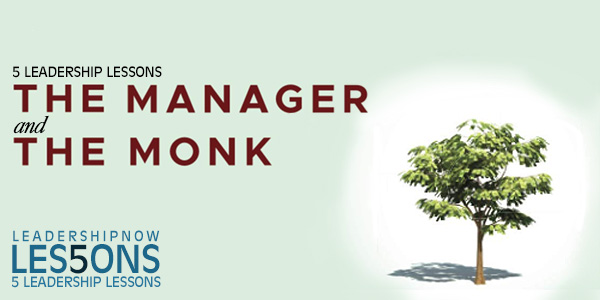5 Leadership Lessons: The Manager and the Monk

The Manager and the Monk is one of those books that comes along every now and again, that will shape and inspire your thinking. It is a deeply philosophical book with very practical applications. The book is essentially a conversation between Jochen Zeitz, the former Chairman and CEO of Puma, and Father Anselm Grün, the financial manager of the Münsterschwarzach Abby near Würzburg, Germany. Zeitz is also co-founder and co-chair with Sir Richard Branson of The B Team.
Together Zeitz and Grün discuss important topics like success, culture, values, acting ethically, the environment, commerce, sustainability, strengths and weaknesses and awareness.
The book reflects their concern to think beyond the immediate concerns of business to how decisions could affect other people and the environment around them. "We should always be aware of the effects of our decisions." In the moment, it is often hard to remember that principle. Here are several thoughts from the book:
 On Leadership
On Leadership: Even in monasteries, one has the illusion that small communities need no authority and that they can lead themselves. But that's a mistake because where there is no clear structure, informal power structures will develop on their own. Then the most assertive Brother will assume leadership, but if his power is not clearly established, he will only exercise it when doing so benefits him. When he is supposed to assume responsibility for the community, however, he will refuse and draw back so that he has no official leadership role. Such unclear power structures are not good for either the community or a firm.
 On Culture: Regarding culture, in my opinion, the most important leadership goals include integration, an open exchange of ideas, building confidence, and striving for greater equality. A leadership culture also has to be fun, and it must promote meaningfulness and innovation, regardless of how close to the wind you may sail sometimes.
On Culture: Regarding culture, in my opinion, the most important leadership goals include integration, an open exchange of ideas, building confidence, and striving for greater equality. A leadership culture also has to be fun, and it must promote meaningfulness and innovation, regardless of how close to the wind you may sail sometimes.
 On Hope: No one can lead a company or corporate group without having hope. Hope is something different from expectation, because the expectation I have for a person or a company can be disappointed. Hoping, on the other hand, means: "I am hoping for you and about you." Hope can never be disappointed, because I will not give up hope that another person will be able to change himself.
On Hope: No one can lead a company or corporate group without having hope. Hope is something different from expectation, because the expectation I have for a person or a company can be disappointed. Hoping, on the other hand, means: "I am hoping for you and about you." Hope can never be disappointed, because I will not give up hope that another person will be able to change himself.
 On Acting Ethically: They think that I can solve all problems, that I have always been kindhearted and understanding in dealing with others, and that I am always in harmony with myself. I realize that I must protect myself against such projections, for they are not good for me. They idealize me. If I were to identify myself with these projections, I would become blind to my weaknesses and would come to a standstill.
On Acting Ethically: They think that I can solve all problems, that I have always been kindhearted and understanding in dealing with others, and that I am always in harmony with myself. I realize that I must protect myself against such projections, for they are not good for me. They idealize me. If I were to identify myself with these projections, I would become blind to my weaknesses and would come to a standstill.
 On Responsibility: Supervision limits the responsibility of every individual, but as human beings we cannot entirely do without it. Every person can and must have freedom in his work as in his life as a whole, in order to be able to assume responsibility. Every individual needs responsibility, for without it he loses interest and joy in his activities. We say that a person "takes on" responsibility. When we have the feeling that we can assume still more responsibility, then in my opinion we will find the means and ways to do this.
On Responsibility: Supervision limits the responsibility of every individual, but as human beings we cannot entirely do without it. Every person can and must have freedom in his work as in his life as a whole, in order to be able to assume responsibility. Every individual needs responsibility, for without it he loses interest and joy in his activities. We say that a person "takes on" responsibility. When we have the feeling that we can assume still more responsibility, then in my opinion we will find the means and ways to do this.
* * *

Follow us on
Instagram and
Twitter for additional leadership and personal development ideas.
* * *

Posted by Michael McKinney at 08:01 PM
Permalink
| Comments (0)
| This post is about Five Lessons










